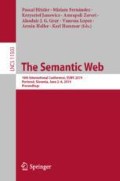Abstract
The popularity of knowledge graphs has led to the development of techniques to refine them and increase their quality. One of the main refinement tasks is completion (also known as link prediction for knowledge graphs), which seeks to add missing triples to the graph, usually by classifying potential ones as true or false. While there is a wide variety of graph completion techniques, there is no standard evaluation setup, so each proposal is evaluated using different datasets and metrics. In this paper we present AYNEC, a suite for the evaluation of knowledge graph completion techniques that covers the entire evaluation workflow. It includes a customisable tool for the generation of datasets with multiple variation points related to the preprocessing of graphs, the splitting into training and testing examples, and the generation of negative examples. AYNEC also provides a visual summary of the graph and the optional exportation of the datasets in an open format for their visualisation. We use AYNEC to generate a library of datasets ready to use for evaluation purposes based on several popular knowledge graphs. Finally, it includes a tool that computes relevant metrics and uses significance tests to compare each pair of techniques. These open source tools, along with the datasets, are freely available to the research community and will be maintained.
Access this chapter
Tax calculation will be finalised at checkout
Purchases are for personal use only
References
Auer, S., Bizer, C., Kobilarov, G., Lehmann, J., Cyganiak, R., Ives, Z.: DBpedia: a nucleus for a web of open data. In: Aberer, K., et al. (eds.) ASWC/ISWC 2007. LNCS, vol. 4825, pp. 722–735. Springer, Heidelberg (2007). https://doi.org/10.1007/978-3-540-76298-0_52
Ayala, D., Hernández, I., Ruiz, D., Toro, M.: TAPON: a two-phase machine learning approach for semantic labelling. Knowl.-Based Syst. 163, 931–943 (2019)
Bast, H., Bäurle, F., Buchhold, B., Haußmann, E.: Easy access to the freebase dataset. In: Proceedings of the 23rd International Conference on World Wide Web, pp. 95–98. ACM (2014)
Bizer, C., Heath, T., Berners-Lee, T.: Linked data - the story so far. Int. J. Semant. Web Inf. Syst. 5(3), 1–22 (2009). https://doi.org/10.4018/jswis.2009081901
Bollacker, K.D., Cook, R.P., Tufts, P.: Freebase: a shared database of structured general human knowledge. In: AAAI, vol. 22, pp. 1962–1963 (2007)
Bordes, A., Glorot, X., Weston, J., Bengio, Y.: A semantic matching energy function for learning with multi-relational data - application to word-sense disambiguation. Mach. Learn. 94(2), 233–259 (2014). https://doi.org/10.1007/s10994-013-5363-6
Bordes, A., Usunier, N., García-Durán, A., Weston, J., Yakhnenko, O.: Translating embeddings for modeling multi-relational data. In: Advances in Neural Information Processing Systems, pp. 2787–2795 (2013)
Gardner, M., Mitchell, T.M.: Efficient and expressive knowledge base completion using subgraph feature extraction. In: Proceedings of the 2015 Conference on Empirical Methods in Natural Language Processing, pp. 1488–1498 (2015)
Ji, G., He, S., Xu, L., Liu, K., Zhao, J.: Knowledge graph embedding via dynamic mapping matrix. In: Proceedings of the 53rd Annual Meeting of the Association for Computational Linguistics, pp. 687–696 (2015). https://doi.org/10.3115/v1/P15-1067
Junghanns, M., Kießling, M., Teichmann, N., Gómez, K., Petermann, A., Rahm, E.: Declarative and distributed graph analytics with GRADOOP. PVLDB 11(12), 2006–2009 (2018)
Mazumder, S., Liu, B.: Context-aware path ranking for knowledge base completion. In: Proceedings of the 26th International Joint Conference on Artificial Intelligence, pp. 1195–1201 (2017). https://doi.org/10.24963/ijcai.2017/166
McFee, B., Lanckriet, G.R.: Metric learning to rank. In: Proceedings of the 27th International Conference on Machine Learning, pp. 775–782 (2010)
Miller, G.A.: WordNet: a lexical database for English. Commun. ACM 38(11), 39–41 (1995). https://doi.org/10.1145/219717.219748
Mitchell, T.M., et al.: Never-ending learning. Commun. ACM 61(5), 103–115 (2018). https://doi.org/10.1145/3191513
Pasca, M., Lin, D., Bigham, J., Lifchits, A., Jain, A.: Organizing and searching the world wide web of facts - step one: the one-million fact extraction challenge. In: AAAI, pp. 1400–1405 (2006)
Paulheim, H.: Knowledge graph refinement: a survey of approaches and evaluation methods. Semant. Web 8(3), 489–508 (2017)
Paulheim, H., Bizer, C.: Improving the quality of linked data using statistical distributions. Int. J. Semant. Web Inf. Syst. 10(2), 63–86 (2014). https://doi.org/10.4018/ijswis.2014040104
Schlichtkrull, M., Kipf, T.N., Bloem, P., van den Berg, R., Titov, I., Welling, M.: Modeling relational data with graph convolutional networks. In: Gangemi, A., et al. (eds.) ESWC 2018. LNCS, vol. 10843, pp. 593–607. Springer, Cham (2018). https://doi.org/10.1007/978-3-319-93417-4_38
Shao, B., Wang, H., Li, Y.: The trinity graph engine. Microsoft Research 54 (2012)
Singh, S., Subramanya, A., Pereira, F., McCallum, A.: Wikilinks: a large-scale cross-document coreference corpus labeled via links to Wikipedia. University of Massachusetts, Amherst, Technical report UM-CS-2012 15 (2012)
Socher, R., Chen, D., Manning, C.D., Ng, A.Y.: Reasoning with neural tensor networks for knowledge base completion. In: Advances in Neural Information Processing Systems, pp. 926–934 (2013)
Speer, R., Havasi, C.: Representing general relational knowledge in ConceptNet 5. In: LREC, pp. 3679–3686 (2012)
Suchanek, F.M., Kasneci, G., Weikum, G.: YAGO: a core of semantic knowledge. In: WWW 2007, pp. 697–706 (2007). https://doi.org/10.1145/1242572.1242667
Toutanova, K., Chen, D.: Observed versus latent features for knowledge base and text inference. In: Workshop on Continuous Vector Space Models and their Compositionality, pp. 57–66 (2015)
Woolson, R.: Wilcoxon Signed-Rank Test. Wiley Encyclopedia of Clinical Trials, pp. 1–3 (2007)
Acknowledgements
Our work was supported the Spanish R&D&I programme by grant TIN2016-75394-R. We would also like to thank Prof. Dr. José Luis Ruiz-Reina, head of the Computer Science and Artificial Intelligence Department at the University of Seville, who kindly provided us with the invaluable resources that helped us in our research.
Author information
Authors and Affiliations
Corresponding author
Editor information
Editors and Affiliations
Rights and permissions
Copyright information
© 2019 Springer Nature Switzerland AG
About this paper
Cite this paper
Ayala, D., Borrego, A., Hernández, I., Rivero, C.R., Ruiz, D. (2019). AYNEC: All You Need for Evaluating Completion Techniques in Knowledge Graphs. In: Hitzler, P., et al. The Semantic Web. ESWC 2019. Lecture Notes in Computer Science(), vol 11503. Springer, Cham. https://doi.org/10.1007/978-3-030-21348-0_26
Download citation
DOI: https://doi.org/10.1007/978-3-030-21348-0_26
Published:
Publisher Name: Springer, Cham
Print ISBN: 978-3-030-21347-3
Online ISBN: 978-3-030-21348-0
eBook Packages: Computer ScienceComputer Science (R0)

